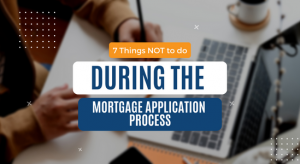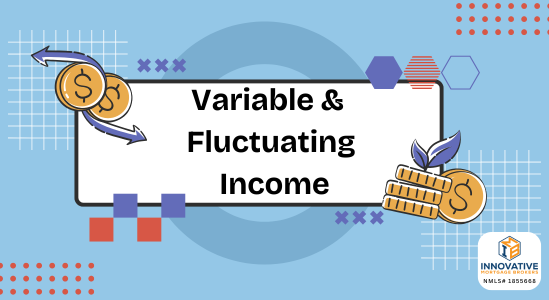Mortgage Tips for Temp Agency Workers In today’s job market, more people are choosing flexible…
7 Things Not to do During the Mortgage Application Process
Applying for a mortgage is a big deal, and the lenders want you to take it seriously. In addition, once you apply for a mortgage, you must keep your credit, income, and assets status quo. Any changes could risk your loan approval.
Some of these ‘don’t do’ items may seem like a stretch, but one mistake could risk your loan approval. So here are seven things not to do during the mortgage application process.
1. Change Jobs
Consider your mortgage application a snapshot in time that you want to keep the same until you close the loan. For example, changing jobs during the mortgage application process sometimes could be like starting over again.
Lenders need a 2-year employment history. However, if you change jobs, you may not have enough history by the time you close on the loan. There are exceptions, such as if you stay in the same industry and make the same money or more, but there could also be risks.
If any of the following occur, it could hurt your mortgage approval:
- Your pay structure changes from salary to commission.
- You start in a new industry that you don’t have proven experience.
- You switch from a W-2 employee to a 1099.
2. Make Large Deposits or Withdrawals
Large deposits or withdrawals are a red flag for lenders. They track your bank statements to ensure you have regular receipt of income and to document the cash needed to close. So, if you suddenly have large withdrawals or deposits, it could signify you have a loan they don’t know about or are receiving money from someone they didn’t approve.
Keep your bank accounts as stable as possible, continuing to receive your income in the same manner via direct deposit and avoiding any deposits or withdrawals that would raise a red flag.
3. Borrow New Loans
If you apply for new loans, your mortgage lender will know about it. They monitor your credit until the loan closes. If they see an inquiry for a new loan on the credit report, they’ll ask about it.
If you borrow a new loan, it can affect your debt-to-income ratio and might decrease your credit score, hurting your mortgage approval. Wait until you’ve closed on your mortgage to apply for any new credit.
4. Pay Bills Late
Lenders base your approval on your credit score. They expect your score to remain the same throughout the mortgage process. If you pay bills late, it could immediately affect your credit score. Your payment history is the largest part of your credit score. A late payment also shows you’re struggling financially, so they may not want to lend you the mortgage any longer if this occurs.
5. Use your Credit Cards
Anytime you use your credit cards for additional expenses, it affects your credit scores. So, avoid using them during the mortgage process to avoid any changes in your credit score. This includes applying for new credit cards or maxing out your current credit cards. Racking up more credit card debt can hurt your credit score and increase your debt-to-income ratio. If you were already on the borderline of qualifying based on your debt-to-income ratio, increased credit card debt could hurt your chances of approval.
6. Co-Sign on any Loans
You might think helping a family member by co-signing a loan is good, but it can hurt your mortgage approval. Co-signing on a loan means you take on the responsibility of the loan. While the primary borrower is responsible for the payments, it becomes your responsibility if he/she doesn’t make the payments.
Because of this, lenders include the payments for co-signed loans in your debt-to-income ratio. It also affects your credit score because the lender must pull your credit to be a co-signer. As a result, the loan will appear on your credit report and can lower your credit score initially because of the new credit and the higher credit utilization.
7. Accept Undocumented Cash
Many loan programs allow you to accept gift funds to help you buy a home. However, if you accept the cash without lender approval, it could backfire.
Lenders have a specific method to track the funds you receive as gifts. But, first, they need to ensure the funds aren’t a loan and didn’t come from an unapproved source, such as a real estate agent or the home seller.
If you have cash you haven’t deposited yet, do so at least 60 days before you apply for a mortgage. This allows the funds to ‘season’ and won’t affect your loan approval.
If you receive gift funds for your home, ask your lender what you must do to document them. Typically, lenders require a gift letter from the donor stating the gift amount and that no repayment is expected. They may also need to track the funds’ origination to ensure there isn’t a loan hidden somewhere.
Final Thoughts
Applying for a mortgage means you’re asking the lender to determine if you qualify for a mortgage based on the information you provided. If you change anything after applying for the mortgage, it could alter your loan approval.
The best thing to do is keep everything status quo. Keep the same job with the same income, don’t open new credit cards or borrow new loans, don’t make unusual deposits or withdrawals, and don’t accept gift funds without your lender’s approval.
Keeping everything as stable as possible will increase your chances of closing your loan on time. But, of course, you should contact your loan officer immediately if something changes outside your control. Some situations can be worked around, and others may cause a delay in processing, but talking with your lender immediately will help you understand.





